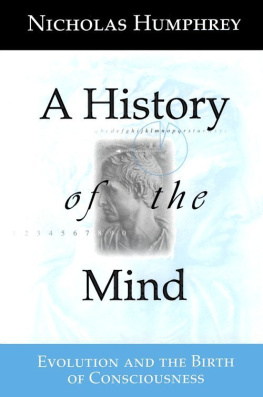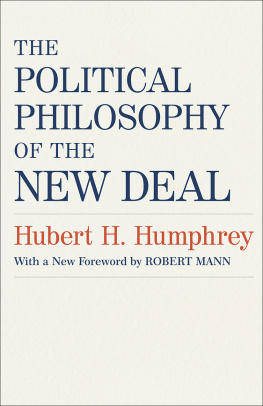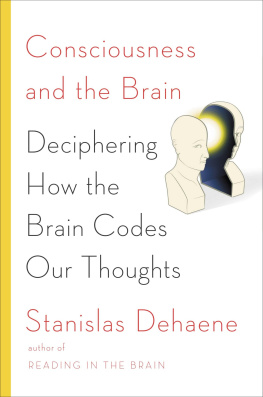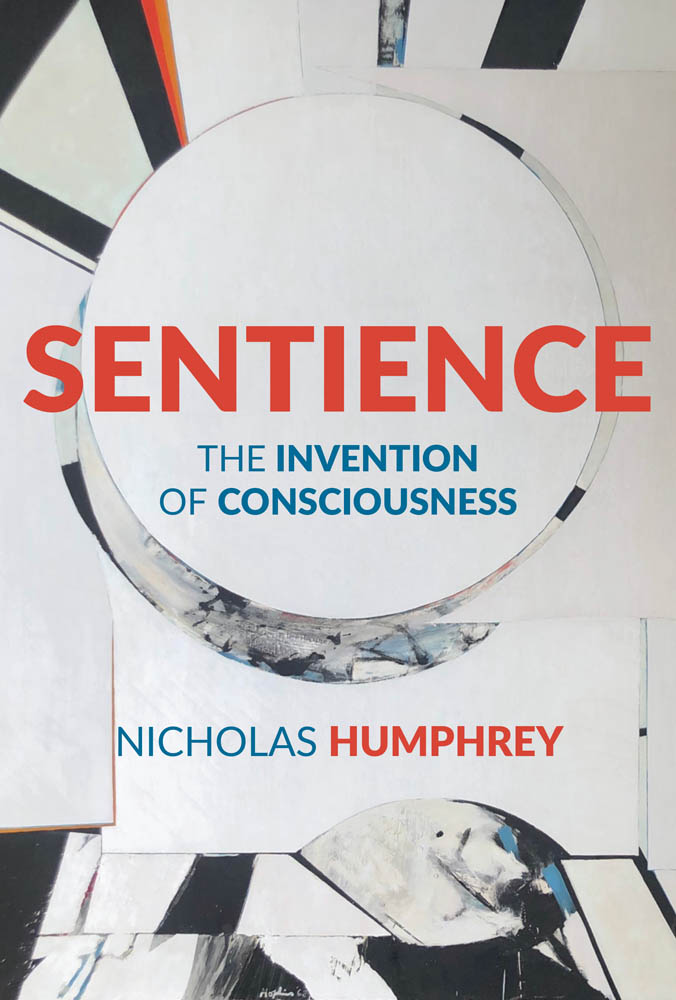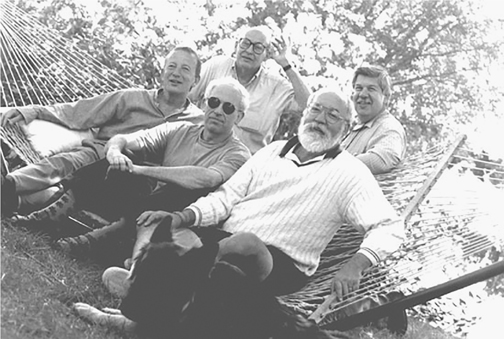
The author (left), with (clockwise) Marvin Minsky, Stephen Jay Gould, Daniel Dennett, John Brockman, Eastover Farm, Connecticut, 1995 Photograph: Katinka Matson
Also by Nicholas Humphrey:
Consciousness Regained
The Inner Eye
In a Dark Time (ed. with Robert Lifton)
A History of the Mind
Leaps of Faith
The Mind Made Flesh
Seeing Red
Soul Dust
2023 Nicholas Humphrey
All rights reserved. No part of this book may be reproduced in any form by any electronic or mechanical means (including photocopying, recording, or information storage and retrieval) without permission in writing from the publisher.
The MIT Press would like to thank the anonymous peer reviewers who provided comments on drafts of this book. The generous work of academic experts is essential for establishing the authority and quality of our publications. We acknowledge with gratitude the contributions of these otherwise uncredited readers.
This book was set in Albertina by Oxford University Press.
Library of Congress Cataloging-in-Publication Data is available.
ISBN: 978-0-262-04794-4
10987654321
d_r0
CONTENTS
PROLOGUE
Hello? (hello) (hello)
A place for big thoughts is a hot tub at night at the edge of the Mojave Desert. It's a couple of hours drive from San Diego, where I've been at a meeting about human evolution. The lodge where I'm staying is surrounded by cactus-like trees. The Mormon pioneers called them Joshua trees because they seem to stretch their arms heavenwards. Lying on my back in the gurgling water, I gaze at the stars and sink into the vastness of space.
Is there anybody there?
If there are extra-terrestrial intelligent beings somewhere in our galaxy, they may be looking at the very same stars I am. Are they conscious of visual sensations like mine? Do they experience this phenomenal blackness, pricked with points of light?
I lie back, arms out sideways holding the rim of the tub. I feel the warmth of the water on my skin, smell the scent of the desert grasses. I'm flesh and blood. I'm soul. How can that be?
Hello, E.T., if you can hear me. Do you have this dual nature too? Is the light on inside your head? Do your sensations have the same eery immaterial quality that mine do?
I want to think so. I want this to be shared.
I hear a coyote bark, then another. Where else on Earth does sentience reside? Do dogs feel pain like mine? Does an earthworm enjoy smells? Are machines ever going to have conscious feelings? Do they already? How could we know?
Barking again. Have the coyotes caught a rabbit? Poor rabbit. One minute she's comfortably scratching her ear, the next a coyote has her by the neck.
What to say about the downside of sentience? The philosopher Schopenhauer wrote: If the reader wishes to see whether the pleasure in the world outweighs the pain, let him compare the respective feelings of two animals, one of whom is engaged in eating the other.
There's a rock in the next valley, sculpted by the winds into the shape of a huge human skull. The hill in Jerusalem where Jesus was crucified was called Skull RockGolgotha in Aramaic, Calvary in Latin. Schopenhauer might have compared the feelings of two humans, one of whom is nailing another to a cross. During the crucifixion it's said that day turned to night. The stars came out.
But suppose conscious beings like us have not evolved anywhere else.
Suppose consciousness as it exists on Earth is a one-off accident of evolution. Astronaut Frank Borman, looking from the window of Apollo 8, remarked, the Earth is the only thing in the universe that has any colour. This can't be strictly true. But it could be true that the Earth is the only place where sensations of colour exist. Or sensations of anything: sweetness, warmth, bitterness, pain. Which would be better: a universe without either joy or tears or a universe with both? Philosopher Thomas Metzinger agrees with Schopenhauer: the net utility is negative. He says that if an all-powerful and all-knowing superintelligence could look across the world of pleasure and pain, and do the sums, it would conclude that it had a moral obligation to eliminate conscious life.
I think he's wrong. We don't live by bread alone. Pain and pleasure can't be all that matters. But there's no question that they matter. When we have reason to think someone is suffering, we have a duty of care. Some people think we have an equal duty towards any sentient beinghuman, nonhuman, even robot. It's not self-evident. But it could still be a rule we choose to live by. In that case, we have a heavy obligation to get it right about what in the world is conscious and what isn't.
The Norwegian government permitted the drawn-out, ugly, killing of more than 1,000 whales, including breeding females. But the Swiss government has made it illegal to boil lobsters alive and the British government soon may do the same.
Descartes believed that it's only humans who have feelings. Non-human animals are all unconscious machines. That's hard to believe. But maybe some animals are unconscious. A moth lands in the water of the hot tub. I scoop it out and toss it aside. Descartes could be right about moths. I hope he is right about moths.
Could Descartes be right about extra-terrestrials? What if the life-forms that exist out there are simply jumped-up insects? They might be ever so clever and still not have conscious feelings. I don't believe there's any necessary connection between intelligence and sentience.
Many peoplefamous philosophers among themstill don't get this. They think that if an octopus can solve a picture-puzzle that a four-year-old child would have trouble with, it probably has sensations something like ours.
Frans de Waal asks, Are we smart enough to know how smart animals are? He writes a beautiful book, Mama's Last Hug. He's sure animals have feelings on the same level that we do. But what he comes up with as evidence is no more than a laundry list of clever tricks.
What about the Argument from Continuity? People say evolution has been a gradual process, without sharp discontinuities. There won't have been any point in history where we could draw a line: unconscious that side, conscious this. So, some kind of consciousness must go all the way down.
Panpsychistsconscious everywhere theoristsbelieve that consciousness is a basic property of physical matter. Even a teacup has a smidgeon of conscious feeling. Panpsychism seems to me a really bad idea. What would a smidgeon be like? Whose experience would it be?
It seems to me that consciousness must either be fully fledged or not there at all. That's certainly my experience of it. I move abruptly in and out consciousness when I wake from sleep or fall back into it again. Why not a similarly abrupt transition in the course of evolution: a critical point when all of a sudden our ancestors woke up, the lights came on? One small step for the brain; one giant leap for the mind?
There's a moving star, slowly arcing across the sky. No, not a star, a manmade satellite.
We human beings are on our way to becoming extra-terrestrial ourselves. Soon there will be sentient beings in space. But we, in our human bodies, won't be able to go beyond our solar system. If we want to explore the stars, we'll have to send intelligent robots in our place. Could these be sentient robotsmachines that value their consciousness as we do? What extra ingredient would be required in their design?


